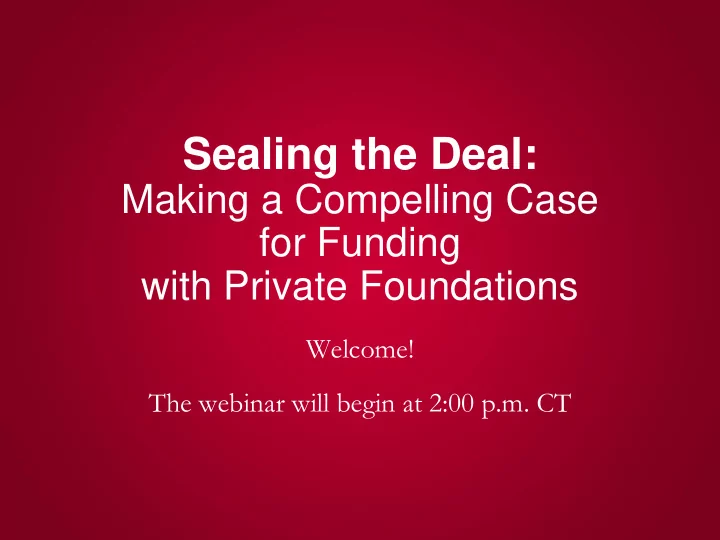

Sealing the Deal: Making a Compelling Case for Funding with Private Foundations Welcome! The webinar will begin at 2:00 p.m. CT
THC Museum Services • The Museum Services Program provides support, resources, and training to museums in Texas. • Consultations • Webinars and workshops • Resources
THC Museum Services www.thc.texas.gov/museum-services • On our webpage: • Webinars • Workshops • Grants and Fundraising • Helpful Resources • Connect and Learn
THC Museum Services • Laura Casey Museum Services Program Coordinator laura.casey@thc.texas.gov 512-463-6427 • Emily Hermans Museum Services Program Specialist emily.hermans@thc.texas.gov 512-463-5921
Upcoming Free Webinars • Bringing Objects & Artifacts to Life • Thursday, February 27, 2:00 p.m. CT • Appraising and Insuring Historical Treasures • Tuesday, March 3, 2:00 p.m. CT • Social Media and Your Cultural Organization: Where to Start • Tuesday, March 24, 10:00 a.m. CT
Dreanna Belden
Sealing the Deal: Making a Compelling Case for Funding with Private Foundations Texas Historical Commission Webinar February 11, 2020
Quick poll: Have you written a grant before?
Discover and Locate Potential Funders • Grants and Fundraising resources on the THC website • Candid (formerly the Foundation Center) • Funding Information Network • The Foundation Directory Online • Profiles for over 166K foundations • Always carefully review their website if one’s available All resources mentioned in this webinar are listed on the Resources document with links All images used in this presentation are public domain materials from Pixabay.com
Quick poll: How many people have used the Foundation Directory Online?
Discover and Locate Potential Funders: Using The Foundation Directory Online
Discover and Locate Potential Funders: Using The Foundation Directory Online
Discover and Locate Potential Funders: Using The Foundation Directory Online
Is it a good fit? • Do they accept unsolicited proposals? • Do their goals align with yours? • How will your proposal meet their program goals? • When do they meet and review grants? • What can you find out from their 990? (let’s take a look at one)
Quick poll: Are you familiar with the IRS 990 form?
The beautiful 990 • If you have a name of a foundation, you can get their 990s from Guidestar • Compare the submission guidelines to their profile • Double check whether they accept unsolicited • If you can’t easily get to a location with the Foundation Directory Online, there’s much useful information here for you • Let’s look at one briefly
Approaching a foundation • Call them. I repeat: CALL THEM. • Unless they say not to do this • Get a meeting if you can • Leverage your board or other connections for introductions • If they only give to pre-selected, this would be your only way in
What are they looking for? Every foundation is different, every single one. A proposal format could be: • A Letter of Inquiry (LOI) • An online submission form • An application package • A list of questions they want addressed in a written proposal to be mailed • Any attachments they want to see Let’s look at some examples:
What are they looking for? The Letter of Inquiry • Always state the amount you need • No more than two pages • Components • Intro/Executive summary • Organization description • Statement of need • Methodology of project/need/workplan • Other funding sources • Final summary https://grantspace.org/resources/knowledge-base/letters-of-inquiry/
What are they looking for? Online Forms • • Name of Organization Program objectives and evaluation • • Contact Info Evaluation criteria • • Primary County where services Evaluation methods • provided Information to be collected • • Project Title How info collected • • Organization’s purpose and history Plan of work • • Describe the nature and extent of the Project start and end date • problem you will address Personnel responsible for program • • How does this proposed effort relate Estimated cost for the project • to the Foundation’s program goals Amount requested from Foundation • • Describe how the population to be Rational for amount requested served has previously been involved or will be involved I developing solutions
What are they looking for? Attachments they may possibly ask for all, some, none of these, or for others! • IRS determination letter proving non-profit status • Latest audit • Last 990s • Complete organizational budget • Project budget • List or bios of board members • What proportion donate? • Diversity of board • Demographics of audience served
Making a compelling case: the groundwork • Be prepared and do the homework • Follow directions • cross the t’s, dot those i’s • Provide thoughtful responses to questions • Put your best foot forward • Make it easy for the reviewer
Making a compelling case: the narrative • Tell a story • State the problem • How will you solve this issue? • How will their support make a difference moving forward? • Add an interesting anecdote • Feature a person who will benefit • Make it clear – you have the resources and personnel to accomplish all this
Making a compelling case: make it strong • Be clear, concise, and to the point • Bullet points are your friend • Workflow • Methodology • Don’t use jargon • You are writing for a lay person • Action verbs, action verbs, ACTION VERBS • Keep an online thesaurus open while you write • Less words are better
Making a compelling case: get feedback • Have non-experts read your proposal • Have experts read your proposal • Have grammar goddesses and gods read it
Advice: the road to success is paved with some failures • You can do this • Don’t give up • Try, try again • Don’t take it personally
Questions? Dreanna Belden dreanna.belden@unt.edu
Recommend
More recommend